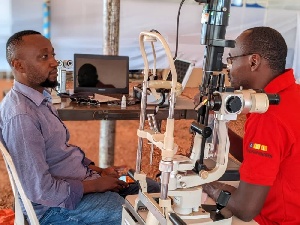- Home - News
- Elections 2024
- News Archive
- Crime & Punishment
- Politics
- Regional
- Editorial
- Health
- Ghanaians Abroad
- Tabloid
- Africa
- Religion
- Photo Archives
- Press Release
General News of Monday, 26 May 2025
Source: www.ghanawebbers.com
COCOBOD spent over $140m on jute sacks it did not need – Acting CEO Randy Abbey
The Ghana Cocoa Board (COCOBOD) spent over $140 million on jute sacks it didn't need. This information comes from the new acting Chief Executive Officer, Randy Abbey.
Dr. Abbey shared these details during a TV3 interview on May 25, 2025. He noted that COCOBOD imported large amounts of jute sacks from 2022 to 2024. This happened despite having significant stockpiles already stored.
He explained that these procurement choices worsened COCOBOD's financial issues. They also raised concerns about how contracts were awarded and supervised.
In the 2021/2022 season, COCOBOD had over 94,000 bales of jute sacks in storage. Still, they ordered an additional 75,000 bales for more than $45 million. Each bale contains 300 sacks, based on projected production needs.
That year, COCOBOD used just over 50,000 bales. This meant their existing stock was sufficient. Despite this, another 75,000 bales were imported the next year at a similar cost.
At that time, over 111,000 bales were still in storage. Dr. Abbey mentioned that only about 17,000 of the newly imported bales were cleared from the port.
In the third year, COCOBOD imported another 56,000 bales and spent over $30 million. Less than 1,000 of those bales were cleared; the rest remain at the port.
“The National Investigations Bureau is currently trying to verify and trace them,” Dr. Abbey said.
He also revealed a $48 million transaction made in December 2024 for irrevocable letters of credit for 80,000 bales. At that time, COCOBOD had more than 70,000 bales in storage and over 110,000 uncleared at the port.
“With irrevocable letters of credit,” he explained, “the money transfers automatically once shipping documents are presented.”
This means they will pay $48 million regardless of whether they need the sacks or not.
Dr. Abbey described this situation as financially damaging for COCOBOD. He stated their current debt is nearly ¢33 billion; some debts date back more than four years.
He noted that financial mismanagement has hindered cocoa farmers from benefiting from rising world market prices. “We must be more careful with spending so farmers can earn more,” he said.
Dr. Abbey also mentioned that COCOBOD owes around $400 million to agrochemical suppliers. In some cases, inputs paid for have not been delivered yet.
Efforts are underway to improve procurement processes and tighten operational procedures at district levels. The goal is to reduce waste and redirect funds to benefit cocoa farmers directly.
Dr. Abbey confirmed that the cocoa season for 2025/2026 is expected to start in August—one month earlier than usual. New producer prices will be announced before this season begins.











